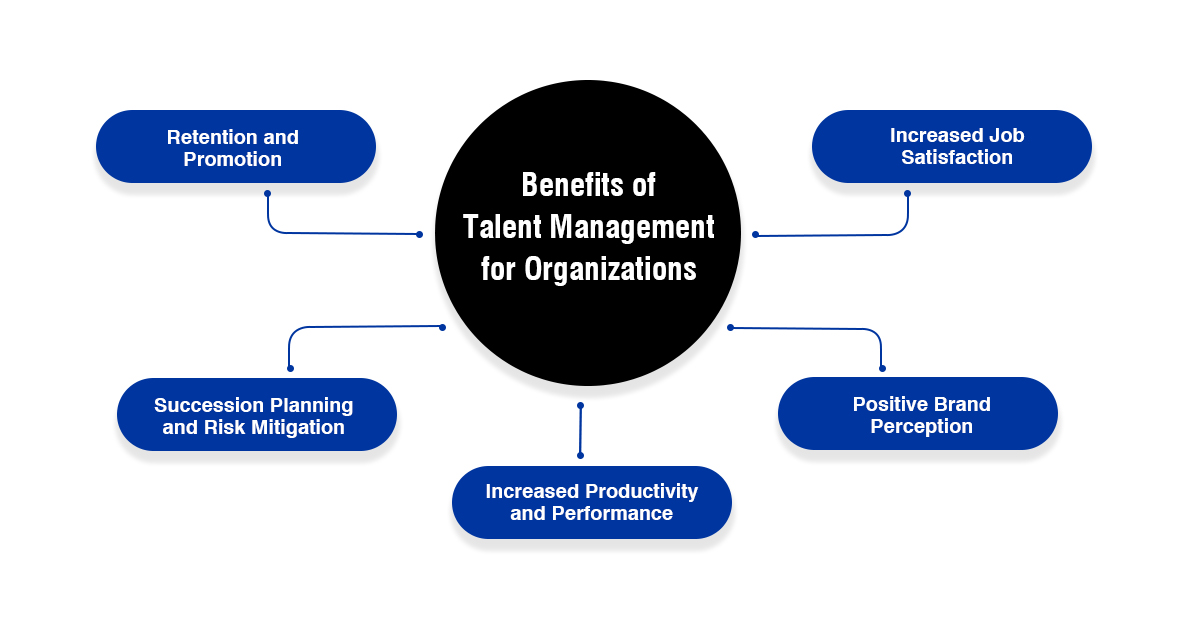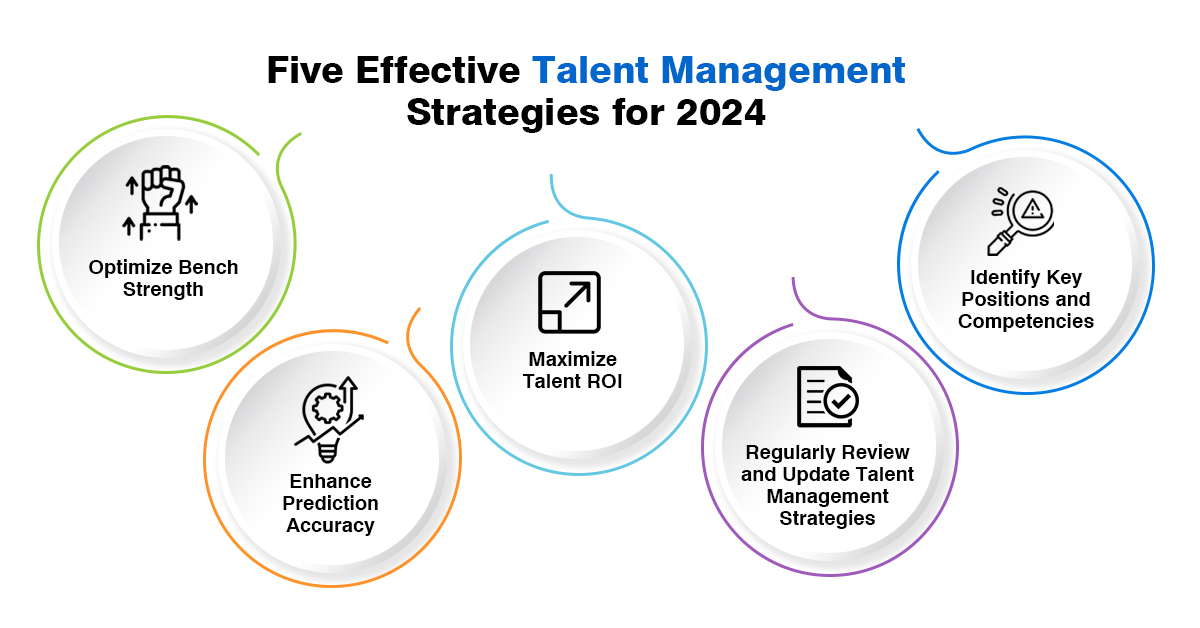
The 2023 Mercer report states that a staggering 99% of companies have been wrestling with diverse talent challenges. As the concerning trend of 'quiet quitting' is on the rise, half of these organizations are anticipating difficulties aligning with their talent models—especially amidst potential economic downturns. This scenario underscores the pressing need for empathetic, people-centric strategies, presenting a formidable agenda for Talent Management in 2024.
Talent management strategies benefit both organizations and employees— playing a crucial role in nurturing and retaining top-notch talent. In this blog, we'll walk through the multifaceted advantages of talent management.
Understanding Talent Management
Talent management isn't just a bunch of HR processes—it's like the heartbeat of a company. Composed of a set of interconnected HR processes strategically designed to attract, develop, motivate, and retain highly productive and engaged employees, talent management strategies extend beyond conventional HR functions, with a primary focus on identifying and nurturing individuals exhibiting substantial potential to significantly contribute to the organization's success.
Everyday instances of talent management can be observed in various scenarios. Take, for example, an apparel retailer aiming to shift its business model from merely providing clothes to offering customers a service-centric experience. Recognizing the need for a new cadre of associates and managers, the organization's leaders deploy assessment and applicant tracking tools. These tools aid in selecting the right candidates, while real-time performance data equips supervisors with insights to make informed decisions, steering the organization toward its transformative goals.
Benefits of Talent Management for Organizations
Skillful talent management is not about ticking boxes; it's about crafting a winning recipe. Here's how it brings growth to your company:

- Retention and Promotion: Instead of always searching for new faces, talent management focuses on keeping your existing stars and giving them a chance to shine in higher roles.
- Succession Planning and Risk Mitigation: It's like having a game plan for the future. Talent management spots and nurtures your future leaders, making sure the show goes on smoothly even if a key player decides to take a different stage.
- Increased Productivity and Performance: Imagine everyone playing a role they're not just good at, but passionate about. That's talent management at work, cranking up the dial on overall productivity and performance.
- Positive Brand Perception: It's not just about what happens inside the office; it's about how your organization is seen on the outside. Talent management says, 'We value everyone,' painting your company as a beacon of inclusivity and a top choice for job seekers.
- Increased Job Satisfaction: Happy employees make for a happy workplace. Talent management fosters an environment where people want to stick around, leading to fewer sick days, better work, and a team that's here to stay, adding a solid dose of stability to your organization.
How Talent Management Benefits Employees?
Now effective talent management is not inclusive of organizational benefits. These strategies also bring numerous benefits to employees—
- Recognition and Rewards: When employees feel genuinely appreciated and compensated, it's not just good for the paycheck — it's like a shield against the temptation of job-hopping. Something that is on an uncontrollable rise. In 2023, it was recorded that 96% of employees were in a rush to look for new positions in different companies.
- Engagement and Advocacy: Imagine being more than a cog in the machine. Effective talent management breaks this ice and empowers employees to become decision-making partners, syncing with the company's mission and becoming cheerleaders for the brand.
- Varied Work Roles: No one likes feeling stuck in a groove. Giving your employees diverse responsibilities not only keeps things interesting but also wards off the depressing monotonousness that can creep in.
- Flexibility and Work-Life Balance: Flexibility isn't just a perk; it's a powerful tool in our talent management toolkit, fostering a culture where personal lives are not just respected but celebrated, because a balanced life makes for happier and more productive team members.
- Alignment with Generational Values: Times are changing, and so are values. Recognizing what matters to the younger crowd is key. Did you know, according to Deloitte, 44% of Millennials and 49% of Gen Z workers choose employers based on personal ethics? It was also found that for 40% of the employees, mental health is non-negotiable.
- Embracing a Holistic Approach: A holistic talent management approach is not just about finding talent; it's about keeping it. Companies that get this right aren't just attracting top talent; they're holding onto it, ensuring success in the wild ride that is the 21st-century work landscape.
Five Effective Talent Management Strategies that You Must Implement in 2024
Implementing effective talent management strategies is crucial for organizational success. By aligning these strategies with business goals, companies can attract, develop, and retain top talent. Here are five effective talent management strategies that you must follow—

- 01. Optimize Bench Strength
Prioritize minimizing mismatch costs by maintaining a lean bench strength. Instead of overpopulating a manpower inventory, strategically hire externally to fill gaps while avoiding skill deficits and preserving organizational culture. Employ the 'Make or Buy' decision framework, considering the accuracy of demand forecasts and the feasibility of talent development.
- 02. Enhance Prediction Accuracy
Mitigate the risk of errors in manpower projections by aligning career plans with dynamic business needs. Recognize the uncertainty inherent in predicting future talent demands and ensure robust retention strategies to validate long-term development and succession plans.
- 03. Maximize Talent ROI
Implement strategies to recover talent investments by emphasizing internal talent development. Reduce upfront costs through cost-effective talent delivery options and reevaluate retention approaches. Explore innovative solutions such as sharing development costs with employees, sponsoring education, and adopting 'promote then develop' programs.
- 04. Regularly Review and Update Talent Management Strategies
The business environment is dynamic, and so are the needs of employees. Regularly reassess and adjust talent management strategies to stay with the evolving business environment and employee needs. This ensures continuous alignment with organizational goals and addresses the dynamic nature of workplace requirements and aspirations.
- 05. Identify Key Positions and Competencies
Identify pivotal roles and the essential competencies for success within the organization. This establishes the foundation for crafting effective talent management strategies that focus on developing and acquiring the skills necessary for key positions.
Conclusion
Talent management has evolved beyond a mere buzzword; today, it stands as a strategic imperative for organizations striving to thrive in this competitive marketplace. The undeniable synergy between effective talent management and organizational success is the backbone of prosperity. By purposefully investing in your most invaluable resource—your employees— the organization can cultivate a resilient and agile workforce, ready to confront the challenges of the future with boldness and innovation.




